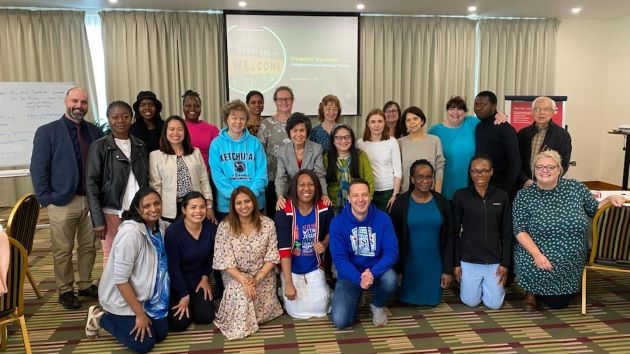The church I want to belong to is Christ centered

Reaching out, she touched the toy and giggled. It lived up to its name, Mr. Wobbly. Its rounded, weighted bottom means that no matter how hard you push, it moves backward and forward, then stands up straight.
Sometimes life seems like Mr. Wobbly. We are out of balance, pulled in different directions. At times like that it is important to know what our center of gravity is: that fixed point in which everything is in perfect balance. For Christians, their center of gravity is Christ. When He is at the center, our lives will be in balance. The theory is simple. The practice is more problematic.
Fellowship, not rules
Sometimes we reduce our Christian experience to a list of rules and regulations that must be obeyed. Obedience is important. Adam painfully discovered this truth. We are not saved by obedience, though; we are saved by what Jesus did when He died on the cross. He did not die for Himself; He died for us.That’s why we are lovingly obedient. It is essential to know the difference.
Living the Christ-centered life is fundamentally about fellowship with our Creator and Saviour. A fellowship in which the center of gravity is love. A love that is so amazing and all-embracing that it transforms the whole basis of our being. Self is no longer our motivating force; rather, God’s love and our fellowship with Him become our gravitational center. Yes, there are rules, but they exist to inform how we live in fellowship with God and those around us.
Righteous living
On a personal level, Christ’s love needs to permeate every aspect of our being: our inmost thoughts, attitudes, and beliefs and how their external expression affects our relationships with others. Put simply, it is living a righteous life. Christ becomes the template and standard for everything we do. It is not an easy option. It requires the application of unfashionable virtues:* humility, purity, honesty, fair-mindedness, courage, forgiveness, and tenacity. The love of Christ works in us, transforming us into the best persons we can possibly be. Unfortunately, this is not an instant transformation, but rather the work of a lifetime.
Everyday things happen, tugging at us, trying to pull us away from our center of gravity—Christ. A myriad of minor irritations such as getting stuck in traffic, or life-changing events such as the loss of a loved one or a serious illness, have the potential to make us forget that love and God’s goodness is the unchang
ing and unshakable center of the universe. Experience teaches us that it doesn’t matter how many times we fall or how badly we fail—if we keep looking at Christ, His love will keep drawing us back into a restorative relationship with Him. He can do that only when we pray and study the Bible to better understand what the righteous life looks like when it is clothed in humanity.
Christ-like Communities
Mahatma Gandhi is reported to have said, “I like your Christ. I do not like your Christians. Your Christians are so unlike your Christ.” The best place to test the truth of this statement is in our local churches. Although we profess our love for Christ, our behavior is often less than loving to those who sit next to us in the pew. Everyone has their own story of occasions when someone’s humanity was displayed in all its ugliness.
The same qualities or virtues that are needed in our personal lives are needed in our churches. What would happen if we listened carefully to what others were saying? What if we gave them the gift of our undivided attention and reflected before we acted? What would happen if we demonstrated true humility, putting others first? What if we had the courage to confront our own and others’ failings in a Christlike way?
About 25 years ago I was involved in a writing project. In the initial stages a large unwieldy group of more than 80 writers gathered for three weeks. They came from around the globe, with different cultural backgrounds, expectations, and abilities. The unenviable and Herculean task of masterminding the project was given to the late Patricia Habada. The potential for failure was infinite.
Pat never seemed to get frus- trated or upset. It was almost a relief when about halfway through the project Pat stopped by the group I was working with and expressed her frustration with one of the other leaders. So it was somewhat of a shock when the next day she gathered the group and the leader she had criticized and said, “I need to make an apology.” She explained how and why she had felt resentful and behaved in a less-than-Christlike way to the other leader, and apologized. She illustrated living the Christ-centered life in the local community and taught those of us there a lesson that none of us have forgotten. She showed and demon- strated Christian respect for all.
A global perspective
How we relate to people every day, and in our local church communities, is far removed from the global church—or is it? For the past nine years I have had the privilege of serving the Adventist Church at the Trans-European Division, which has given me the opportunity and education of participating in the global decision-making processes.
It’s easy to miss the astonishing reality that Seventh-day Adventism is a global church and a worldwide movement. Every language, every culture, every political system, together with vastly differing economic systems, are the care and responsibility of church leaders. Differences can develop, feelings may be hurt, disrespect can be manifested. It is inevitable; even Peter and Paul argued over behavior.
Leaders are human. But in my experience the leaders of our church are righteous men and women. In the main they place the will and purpose of God above their personal feelings. They work and pray for unity. They demonstrate respect for each other, putting God’s will before their own. The enormity of the global challenges to advance the gospel in a confused and evil world can be met only through the daily sustained prayers of members for their church leaders.
To anyone who wants to live a Christlike life, Jesus made our marching orders clear: “Love one another. As I have loved you, so you must love one another. By this everyone will know that you are my disciples, if you love one another” (John 13:34, 35, NIV).
* A stimulating and helpful book reflecting on virtues is Philip E. Dow, Virtuous Minds: Intellectual Character Development (Downers Grove, Ill.: InterVarsity, 2013). A helpful article on the importance of virtues is Frank M Hasel, “Virtuous Thinking,” Adventist Review, Jan. 5, 2018.








